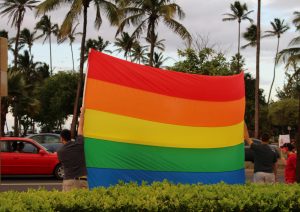DOH Publishes Hawaiʻi’s First LGBT Health Data Report
The first-ever Hawaiʻi Sexual and Gender Minority Health Report was released today by the Department of Health.

Gay rights. File photo by Wendy Osher.
The report revealed that, compared to heterosexual youth and adults, lesbian, gay, and bisexual youth experience many early risk factors that contribute to poorer health outcomes in adulthood.
“We are pleased to share our current research on the health of Hawaiʻi’s sexual and gender minority people,” said Dr. Virginia Pressler, Director of Health. “The new findings will help us tailor programs to better address the health challenges of LGBT people in our State.”
Over 10% of public high school youth identify as LGB or questioning, and 3% of adults aged 18 years and older identify as LGB. An additional 5,600 adults in Hawaiʻi identify as transgender or gender non-conforming.
According to the report, sexual and gender minority people experience discrimination and stigma, and are often victims of bullying, family rejection, and lack of acceptance. Consequently, LGB and questioning youth experience greater mental health challenges than heterosexual youth. Half of LGB youth reported feeling sad or hopeless, and 60% report purposely hurting themselves through behaviors such as cutting or burning themselves. Each year, nearly one in three LGB youth attempt suicide.
The report also found that LGB youth are also more likely to engage in unhealthy behaviors that increase their risk for chronic disease and poor health outcomes later in life. One-quarter of LGB youth report that they currently smoke cigarettes, and nearly half drink alcohol. One in ten LBG youth also say they have injected illicit drugs at least once in their lifetime.
Consistent with the findings on youth, the report shows that LGB adults live with poorer health outcomes than heterosexual adults. Forty percent of LGB adults report having multiple chronic conditions, and they are twice as likely as heterosexual adults to suffer depression.
The report added that women identifying as lesbian or bisexual also experience poorer health outcomes compared to heterosexual women. One-quarter of lesbian or bisexual women have asthma, and they are three times more likely to have a stroke. Men identifying as gay or bisexual are seven times more likely to experience abuse by a partner, and three times more likely to be a victim of rape or attempted rape.
“The report demonstrates that there is much work to be done to understand and address the unique challenges of sexual and gender minority people,” said Lola Irvin, Administrator of the Chronic Disease Prevention and Health Promotion Division. “By improving the health of at-risk and undeserved populations, we will make Hawaiʻi a healthier, happier place for all our citizens.”
To download a copy of the report, please click here.










